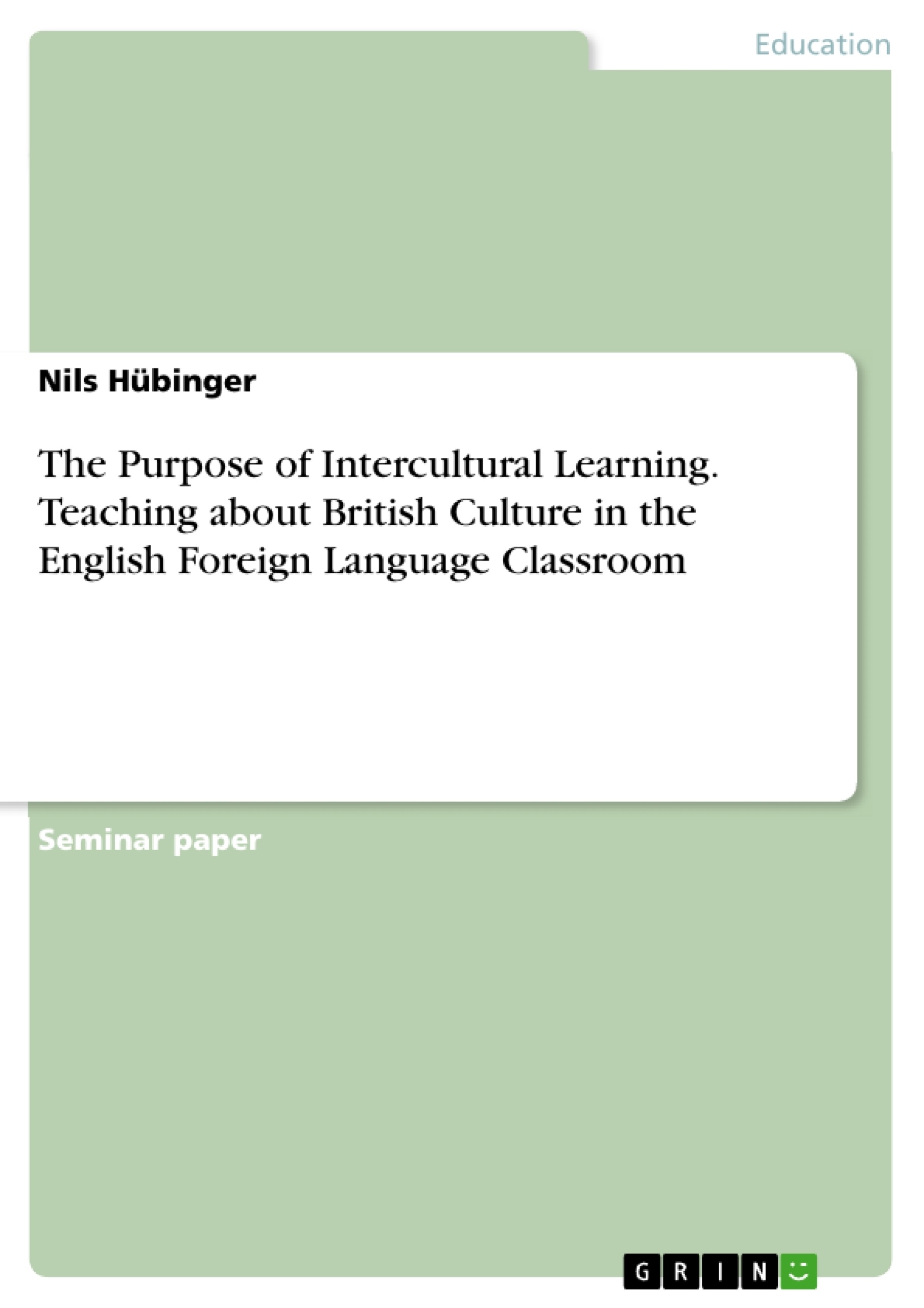When it comes to the English foreign language classroom, often people’s first associations are grammar rules or learning vocabulary. In fact, it needs much more to learn a language and be able to use it properly, than just achieving grammatical skills and knowledge in terms of vocabulary. In order to internalize and successfully apply English as a foreign language in spoken and written code, it will not suffice to merely learn about syntax, lexis, phonology and other features that structure the language. The learner should also be aware of the specific cultural background, which speakers of the English language have. Cultural awareness is necessary in order to show etiquette and avoid misunderstandings in intercultural communication. Thus, intercultural communicative competence is a quality, which helps speakers of English as a foreign language to successfully communicate with native speaker. English - as much as any other language - has developed over centuries and was shaped by culture. Therefore, intercultural learning plays an important role in foreign language learning and should be systematically integrated in the English foreign language classroom.
As a matter of fact, English has become the official language of many nations worldwide and every nation developed its own history and culture, there are many cultures involved when it comes to learning about English culture. Since the English language originates from Britain, this term paper will focus on approaching British culture in the English foreign language classroom and its necessity for the development of an intercultural communicative competence.
The term paper will commence by giving a definition of culture and what it has to do with language in general. In the next step, it examines the purpose and development of intercultural learning in the foreign language classroom. Finally, this term paper gives an overview of how intercultural learning can be approached. It works as a guide for teachers and offers practical examples for the English foreign language classroom with focus on British culture.
Inhaltsverzeichnis (Table of Contents)
- Introduction
- What is Culture and How Does It Connect to Language?
- The Development and Relevance of Intercultural Learning in the English Foreign Language Classroom
- How to Approach (Inter-) Cultural Learning with Focus on British Culture?
- Conclusion
Zielsetzung und Themenschwerpunkte (Objectives and Key Themes)
This term paper aims to explore the significance of intercultural learning in the English foreign language classroom, focusing on how to approach British culture in particular. It argues that learning English effectively goes beyond grammar and vocabulary, requiring an understanding of the cultural context in which the language is used.
- The definition of culture and its relationship to language.
- The development and relevance of intercultural learning in the foreign language classroom.
- Different approaches to teaching intercultural learning, with a specific focus on British culture.
- The importance of intercultural communicative competence for successful communication in English.
Zusammenfassung der Kapitel (Chapter Summaries)
- Introduction: This chapter establishes the importance of cultural awareness in English language learning, arguing that it is crucial for effective communication and avoiding misunderstandings. The chapter highlights the role of British culture as the origin of the English language and the significance of intercultural learning in the English foreign language classroom.
- What is Culture and How Does It Connect to Language?: This chapter explores various definitions of culture, emphasizing its multifaceted nature and its impact on social life. It discusses the connection between culture and language, explaining how language reflects and shapes cultural values and practices.
- The Development and Relevance of Intercultural Learning in the English Foreign Language Classroom: This chapter examines the history and importance of intercultural learning in the foreign language classroom. It explores how intercultural learning promotes understanding and appreciation of different cultures, leading to improved communication skills.
- How to Approach (Inter-) Cultural Learning with Focus on British Culture?: This chapter provides practical strategies and examples for teaching intercultural learning in the English foreign language classroom. It focuses on British culture, highlighting specific aspects that can be explored through language learning activities.
Schlüsselwörter (Keywords)
The primary keywords and focus topics of this paper are: intercultural learning, British culture, English as a foreign language, communication, cultural awareness, language acquisition, cultural diversity, and intercultural communicative competence. This paper explores the connections between language and culture, emphasizing the crucial role of intercultural understanding in effective communication and language learning.
Frequently Asked Questions
Why is intercultural learning important in English language teaching?
It is essential for developing intercultural communicative competence, which helps learners avoid misunderstandings and follow social etiquette when talking to native speakers.
Does learning a language only involve grammar and vocabulary?
No, effective language use requires an awareness of the cultural background, values, and social norms associated with the language.
Why does this paper focus specifically on British culture?
Since the English language originates from Britain, understanding British culture provides a fundamental context for learners of English as a foreign language.
How can teachers approach intercultural learning in the classroom?
Teachers can use practical examples, cultural comparisons, and activities that explore British history, lifestyle, and social values to build awareness.
What is intercultural communicative competence?
It is the ability to communicate effectively and appropriately with people from other cultures by combining language skills with cultural knowledge and empathy.
- Quote paper
- Nils Hübinger (Author), 2010, The Purpose of Intercultural Learning. Teaching about British Culture in the English Foreign Language Classroom, Munich, GRIN Verlag, https://www.grin.com/document/213785



